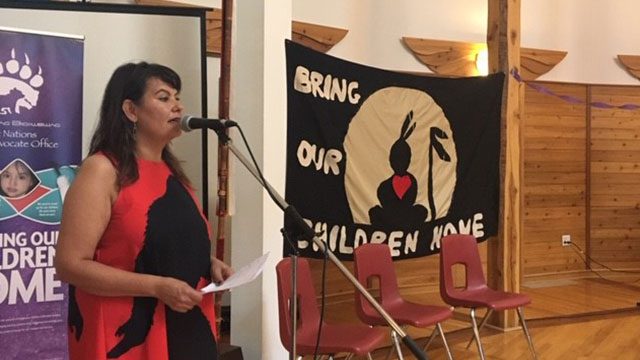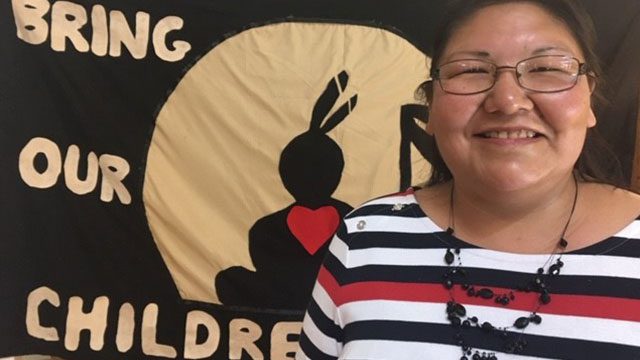
Dozens of families gathered in Winnipeg Friday to celebrate the fourth anniversary of the First Nations Family Advocate’s Office (FNFAO), an organization whose mission is to keep First Nations children and parents together.
Roberta Godin is one of them.
Just two years ago Godin was a marked woman.
Child and Family Services placed a birth alert on the First Nations woman following the apprehension of her three children approximately 20 years prior.
When a woman has a birth alert attached to her name, doctors and nurses notify a child welfare agency once she’s given birth.
In most cases the newborn is then apprehended.
(“If I didn’t contact them… they would have just came and took him away,” says Roberta Godin of the organization. Photo: Brittany Hobson/APTN)
Because Godin’s now adult kids were permanent wards of the province, she was at risk of losing her fourth child.
But with the help of the FNFAO, Godin was able to maintain custody of her youngest son Robert who is now 18-months-old.
Once Godin became pregnant she contacted a local agency.
“If I didn’t contact them I would have found out directly at the hospital. They would have just came and took him away,” said Godin during the FNFAO celebrations at Thunderbird House in Winnipeg.
Godin is one of the nearly 1,600 families the office has helped since opening in June 2015.
The Assembly of Manitoba Chiefs created the office following the death of Tina Fontaine in 2014.
Fontaine, who’s body was pulled from Winnipeg’s Red River, was in the care of Child and Family Services at the time of her death.
The office opened with only two employees and has since expanded to include a team of 35.
“We’re fighting against something that’s really huge,” Cora Morgan said referring to the 11,000 children who are in care in Manitoba.
Morgan, who is the First Nations Family Advocate for Manitoba, says the office is creating change.
This includes reunifying families, helping parents avoid apprehensions and birth alerts and securing visitation rights or kinship placements.
The office also provides traditional parenting programs and cultural services to women and men.
“I decided to go through programming and get help because I knew that I wouldn’t stand a chance of being able to bring my son home from the hospital,” said Godin.
Godin was assigned a prenatal worker and participated in the traditional parenting program where participants learn Western world teachings like formula feedings, bottle sterilization, safe sleep practices along with First Nation traditional teachings.
“I struggled with my own parenting skills because of my mother’s parenting skills or lack of them,” said Godin.
“Now that I’ve got all these skills I’m applying them.”
With a little support families are able to succeed, says Morgan.
“We want to be that one positive circle and a constant in their lives…to rely on because a lot of times our moms are all alone and they have very few supports and resources,” said Morgan.
In order for change to occur, Morgan says the provincial government must hand over jurisdiction to First Nations.
She also calls for the removal of birth alerts. This was a recommendation she put forth during the National Inquiry into Missing and Murdered Indigenous Women and Girls’ institutional hearings on the child welfare system last fall.
The recommendation was included in the inquiry’s final report released earlier this week.
“This child and family services system is a huge drain on the quality of life for our people,” said Morgan.
“When I think about the inquiry and the issue of missing and murdered Indigenous women and girls I’m always reminded of their connections to the child welfare system.”
Godin says being marked with a birth alert left her feeling like a lost cause.
She calls on the governments to create more supports for mothers in need not just before birth but after as well.
“Even though we get our children home we still need that next step,” said Godin.











